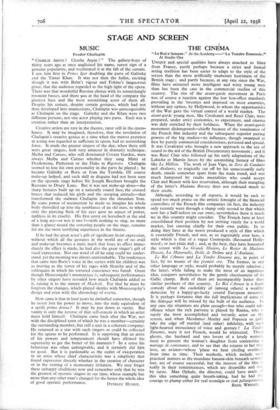STAGE AND SCREEN
MUSIC
Feodor Chaliapin
" CHARLIE ARPIN ! Charlie Arpin ! " The gallery-boys of thirty years ago at once anglicised his name, surest sign of a genuine popularity, and vociferated it at the fall of the curtain. I saw him first in Prince Igor doubling the parts of Galitzky and the Tartar Khan. It was not then the ballet, exciting though it was with Bolm's vigour and Fokine's languorous grace, that the audience regarded as the high light of the opera. There was that wonderful Russian chorus with its astonishingly resonant basses, and there was at the head of the company the greatest bass and the most astonishing actor of them all. Despite his stature, despite certain gestures, which had not then developed into mannerisms, Chaliapin was unrecognisable as Chaliapin on the stage. Galitzky and the Khan were two different persons, not one actor playing two parts. Each was .a creation rather than an interpretation.
Creative artists are rare in the theatre, rarer still in the opera- house. It may be imagined, therefore, that the revelation of Chaliapin's creative genius at a time when the merest pretence at acting was regarded as sufficient in opera, had an astonishing force. It made the greater singers of the day, when there still were great singers, look very amateur in dramatic technique. Melba and Caruso, who still dominated Covent Garden, were always Melba and Caruso whether they sang Mimi or Desdemona, Pinkerton or the Duke in Rigoletto. Chaliapin seemed to lose his own personality in the parts he played ; he became Galitzky or Boris or Ivan the Terrible. Of course make-up helped, and such skill in disguise had not been seen on the operatic stage before Sir Joseph Beecham brought the Russians to Drury Lane. But it was not make-up alone—the sharp features built up on a naturally round face, the crossed braces that reduced his girth and the stooping attitude—that transformed the stalwart Chaliapin into the shrunken Ivan. By some power of mesmerism he made us imagine his whole body shrivelled up into the semblance of an old man, to whom only the piercing flash of his eyes gave an aspect of power, ruthless in its cruelty. His first entry on horseback at the end of a long act—or was it two ?—with nothing to sing, no more than a glance round the cowering people on the stage, remains for me the most terrifying experience in the theatre.
If he had the great actor's gift of significant facial expression, without which all the gestures in the world are of no avail and make-up becomes a static mask that loses its effect imme- diately the effect is made, he had also the great singer's gift of vocal expression. Not one word of all he sang could we under- stand, yet the meaning was always unmistakable. The tenderness that came into Boris's voice in the scenes with his children was as moving as the terror of his rages with Shuisky and of the soliloquies in which his tortured conscience was bared. Great though Moussorgsky's masterpiece is, subsequent performances by other singers have revealed how much Chaliapin added to it, raising it to the stature of Macbeth. For that he must be forgiven the changes, which played skittles with Moussorgsky's design and even with the chronology of events.
How came it that in later years he dwindled somewhat, though he never lost his power to move, into the male equivalent of a spoilt prima donna? It may be put down to vanity. But vanity is only the reverse of that self-esteem in which an artist must hold himself. Chaliapin came back after the War, not with the disciplined team of which he was a member—certainly the outstanding member, but still a unit in a coherent company. He returned as a star with such singers as could be collected for the operas to be performed. Is it surprising that an artist of his powers and temperament should have allowed his superiority to get the better of his manners ? In a sense his behaviour was often unforgivable, and it certainly did him no good. But it is pardonable as the outlet of exasperation in an artist whose chief characteristic was a simplicity that found expression directly whether in the creation of character or in the venting of a momentary irritation. We may forget these unhappy ebullitions now and remember only that he was the greatest of operatic singers in our time, whose example has more than any other man's changed for the better the whole idea










































 Previous page
Previous page